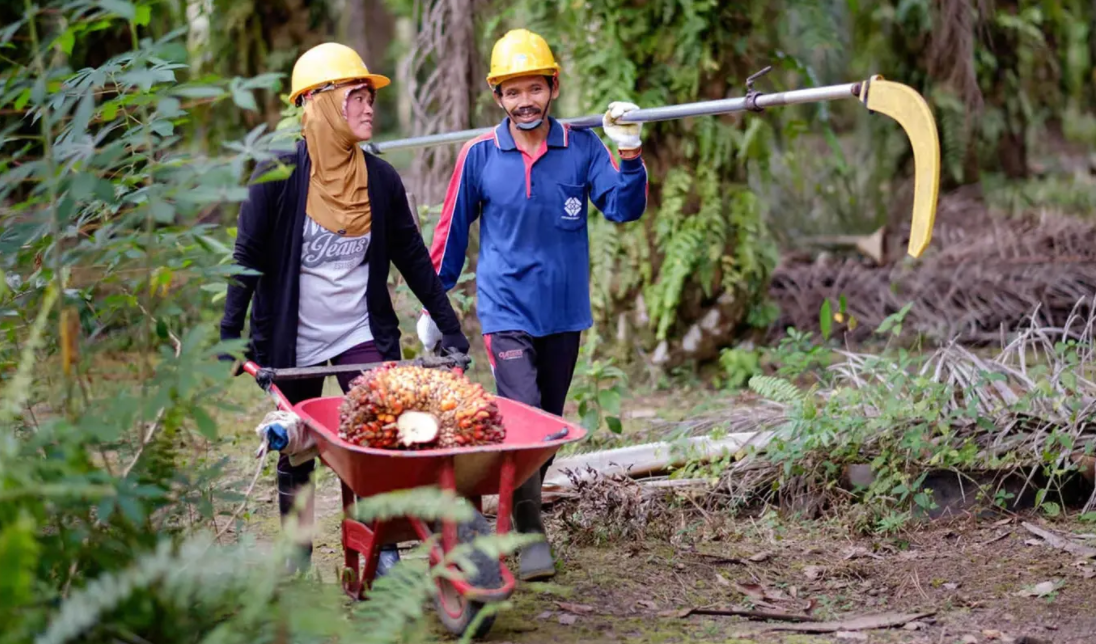Our ‘sustainable village’ project in Indonesia is an example of how we’re working with smallholder farmers to improve their livelihoods while, at the same time, protecting nature.
Across the globe, almost half a billion people earn their income by working on small family farms. But this life can be hard. Many don’t have access to training, financial support or even rights to their land. And a changing climate is increasingly affecting harvests, making their livelihoods ever more fragile.
Yet, when empowered with the right knowledge, skills and opportunities, they can be stewards of the land: vital partners in the effort to stop deforestation and regenerate nature.
Since 2010, Unilever has empowered 834,000 smallholder farmers to improve their agricultural practices and increase their livelihoods.
An example of this is a palm oil project we’re running in Indonesia’s Central Kalimantan region. With our partner Yayasan Inobu – a non-profit research institute – alongside local governments and farming co-operatives, we’re working to improve the yields and incomes of smallholders.
We started in 2016, working with smallholder farmers to apply sustainable agricultural practices. To date, we’ve helped certify more than 1,000 smallholders in two districts – according to principles of the Roundtable on Sustainable Palm Oil (RSPO) and the Indonesian Sustainable Palm Oil (ISPO) certification systems – and we’re in the process of helping 2,500 more. This has created the first certified sustainable villages in the palm oil industry, which means oil palm sourced from these areas is responsibly produced.
Benefits for the whole community
One reason why the productivity of oil palm smallholders is generally low is because many still have limited access to more technical knowledge and skills. Few have the resources to support themselves through certification.
Through Inobu’s programme, we’re seeing a significant change in how farmers treat the environment, particularly in terms of managing waste, and protecting the land and surrounding water sources.
The extra income derived from better yields and from selling certified sustainable palm oil – which can be sold at a higher price – is channelled into upgrading facilities and services that benefit the whole community. In Pangkalan Tiga village, for example, the extra income is used to support a convenience store to meet people’s daily needs and an agro-tourism site to provide more leisure activities.
A new integrated cattle ranch allows the community to repurpose waste materials and provides additional economic value to the farmers. Palm by-products such as fronds are used in feed for livestock, cow manure is used for fertiliser for the oil palms, and a by-product from the mill is used in fish feed.

A novel approach
Our project with Inobu is one example of how we’re working to transform the palm oil industry using what’s called a jurisdictional approach to certification. That means looking at sustainability on a village, district or province level through the lens of a set of indicators to be measured against and complied with. The idea is that, once a jurisdiction obtains certification, all commodities coming from there can be counted as sustainably produced.
“At Unilever, we know we must work in partnership when driving transformational change for planet and people,” says Rauf Prasodjo, our Sustainable Sourcing Manager. “Thanks to the expertise and deep local knowledge of Inobu and the support of local governments and farmer co-operatives, the smallholders of Pangkalan Tiga village have been able to switch to more sustainable farming methods and to better support their families.”
We have similar programmes that reach more than 9,000 independent oil palm smallholders across Indonesia and Malaysia with the help of partners. To continue supporting the demand for certified sustainable palm oil, Unilever has been one of the largest buyers of RSPO smallholder credits. Our aim is to incentivise smallholders to continuously implement sustainable and regenerative agriculture practices.
“The tangible benefits to farmer communities since the start of the project have been encouraging,” says Heni Martanila, Certification Manager at Yayasan Inobu. “Some smallholder farmers tell us they’re glad they took up the sustainable farming training we provided. That, to us, is great validation.”
Discover more about what we’re doing to protect and regenerate nature.
This blog was originally posted on the Unilever Website, you can read it here.
